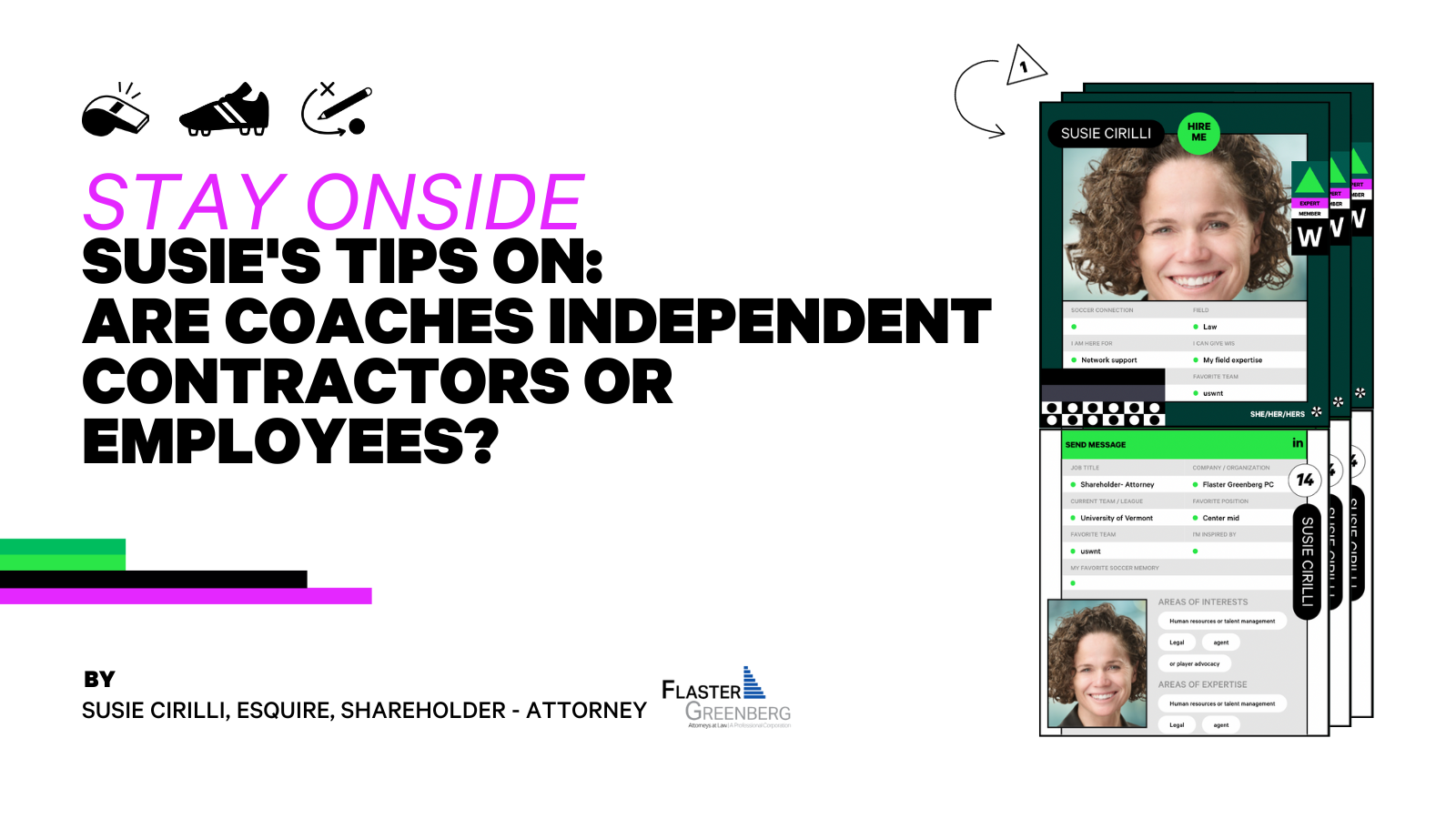ARE COACHES INDEPENDENT CONTRACTORS OR EMPLOYEES?
An issue that all businesses must always grapple with, is classifying the individuals performing work. Generally, there are two (2) types of individuals performing work: (1) Independent Contractors (1099) and (2) Employees (W-2). Some businesses see independent contractors as a beneficial classification for many reasons, namely the business does not have to pay employment taxes on the individual’s wages, obtain workers compensation insurance, pay minimum wage, or pay overtime.
Turning specifically to soccer clubs, specifically youth soccer clubs, this is a hot issue. Now, some clubs may classify their coaches as Independent Contractors, because, after all, they are only coaching in the evenings and weekends. The Club’s position may be that the Coach works part time. However, as explained below, the part-time nature of a coaching role is insufficient to demonstrate independent contractor status.
Clubs across the country must evaluate whether their classification of coaches, and any other workers, as independent contractors is compliant with applicable law to mitigate risk of not only litigation from an individual performing work, but also investigations, fines and penalties from government agencies.
A Little Background
There is not just one (1) test for an independent contractor. Each body of law has its own test. The five(5) major tests worth reviewing are: (1) Workers Compensation, (2) Unemployment Compensation,(3) Fair Labor Standards Act (and state specific wage payment laws), (4) Title VII, and (5) the Internal Revenue Service (IRS).
Let’s dig a little deeper…
Each of the above referenced laws applies to employees- not independent contractors. Workers Compensation is a statutory system to address employee injuries on the job. The Fair Labor Standards Act mandates, among other things, overtime and minimum wage for employees. Title VII protects employees against discrimination in the workplace. The IRS requires employers to make certain deductions on employees’ paychecks. It follows that if a coach is an independent contractor, Title VII does not apply. With that being said, there may be state specific laws that protect the Independent Contractor. .
Gnarly situations arise when a Club classifies a coach as an independent contractor, but in reality, that coach is an employee (“Misclassification”) In that situation, a coach may actually be protected under Title VII, eligible for overtime pay, and eligible for Workers’ Compensation for injuries on the job. These situations are brought to light one of three ways: (1) proactively by the club by conducting classification audit, (2) the issue is raised by the coach themselves, or (3) a government agency conducts an investigation.
Let’s take a look at each law and test…
WORKERS’ COMPENSATION
What is Workers Compensation? Each state has its own workers’ compensation (“WC”) statute. These statutes require employers to obtain workers compensation insurance. This insurance covers employees who are injured on the job. To clarify, when an employee is injured on the job and is unable to work, then that individual can receive payment (“Workers’ Compensation Payment”). Now, under this statutory framework, this also protects the employers. Because workers’ compensation exists, employees are prohibited from suing their employer for on the job injuries, expect under limited circumstances. So, employers are protected from constant litigation.
Each State Has its Own WC Employee Test. Clubs must consult the law of the states where they do business. Each state defines what an employee is, and some even provide a test for independent contractors. Failure to obtain proper WC Insurance carries penalties, fines, and other liabilities.
Soccer Thoughts:
- Players. Professional soccer players are employees of the club or leagues. When they are injured on the pitch, they are prohibited from suing the league or their club for lost wages. Instead, workers compensation “kicks in” and the player receives compensation through the league/team’s workers compensation insurance policy.
- Coaches. Clubs must review the specific WC statute and assess each position within the entity. When a Club works directly with the coach, this is a straightforward analysis.
- Clubs Using Outsourced Coaching. Some Clubs utilize organizations that provide coaches for the Club. In other words, the individual coach contracts with an entity, and that entity then places the Coach with the Club (“Placement Company”).. Here, it is crucial for the club to do the following:
- Review the State WC Statute. Some WC statutes address this specific situation and require the Placement Company submit proof of WC insurance to the companies with whom they contract (i.e.- Clubs).
- Revise Contracts. Ensure that all contracts with Placement Companies are in line with the WC statutes. Prudent Clubs will add terms requiring the Placement Company to submit proof of WC Insurance annually.
UNEMPLOYMENT COMPENSATION
Another state specific analysis is the test for Independent Contractor under the state Unemployment Compensation laws. Briefly, Unemployment Compensation is compensation that individuals can apply for when they are separated from employment. Just like Workers’ Compensation, in most cases, an individual must be an employee. Failure to properly classify an individual for the purposes of unemployment compensation can result in penalties and fines. Each state has its own statute for unemployment compensation, and clubs must check within their jurisdiction to assess the test. A common test that is followed by many jurisdictions is known as the ABC test, which is a balancing of the following factors:
- Control – The individual is free from the control or direction over the performance of their services (in contract and in fact);
- Course of Business – The service provided is outside of the usual course of business of the entity;
- Independent Business – The individual is engaged in an independently established trade, occupation, profession or business.
Again, Clubs must confirm the test for their jurisdiction to ensure they are compliant with state specific unemployment compensation laws.
FAIR LABOR STANDARDS ACT
On January 9, 2024, the Department of Labor announced the final regulations on the issue of independent contractors under the Fair Labor Standards Act (“FLSA”). Briefly, the FLSA is the law that covers overtime pay for employees, among many other things. Now, the statute itself does not set out a definition of an independent contractor. Rather, employers rely on the federal regulations that accompany the statute to explain the definition of an independent contractor. The new regulations announced on January 9, 2024, become effective on March 11, 2024. It follows that from this time period until March 11, 2024, the old test applies. Then beginning on March 11, 2024, the new test applies.
OLD TEST
Let’s take a look at the “Old Test.” The old regulations that were effective in January of 2021 and remain in effect until March 10, 2024. were withdrawn and then tied up in litigation. The factors for the old standard relate to the extent the Independent Contractor (“IC”) relied on the employer for work, i.e., the worker’s economic dependence on the business.. In order to evaluate economic dependence, two factors (“Core Factors”) are considered: (1) the nature and degree of the control over the work, and (2) the individual’s opportunity for profit and loss.
Much emphasis is put on these two Core Factors. However, other factors considered, after the Core Factors are: (1) the amount of skill required for the work, (2) the degree of permanence of the relationship, (3) whether the work is an integral part of the production, and (4) any other factors.
NEW TEST
The new Independent Contractor (“IC”) test comes into effect March 11, 2024. This rule restores the test applied before January , 2021 and embraces an balancing test known as the Economic Realities Test. For this test, there is no dispositive factor. Rather, it is a balancing test of the various factors. Below are the factors with soccer analysis:
- Opportunity for Profit or Loss Depending on Managerial Skill. Part of this analysis is (1) whether the individual can meaningfully negotiate the amount of money charged for the services, (2) whether the individual chooses the order and/or time in which the jobs are performed, (3) whether the individual engages in marketing, advertising and the like for the company.
- Soccer Analysis
- Negotiate. Negotiate with IC’s on payment for services
- Schedule. Allow coaches to schedule the times of their training sessions.
- Require Legal Entity. Consider only contracting with Coaches who have a legal entity.
- Contract with Entity. Make the IC Agreement between the Club and the Entity (not the individual), and include the coach’s name.
- Explicit Contractual Language. Include specific language that states that the Club does not prohibit the IC from marketing or advertising, or taking work elsewhere.
- Require IC Invoices. Require IC’s to submit invoices to the clubs for payment
- Soccer Analysis
- Investments by Worker and Employer. Assess how much investment the individual makes into their own enterprise.
- Soccer Analysis
- Equipment. Require Coaches to bring their own equipment
- Coaching Attire. Allow coaches to wear their own gear.. Clubs may want to consider giving the IC’s choice as to what they wear to training and matches. For example, perhaps the IC’s can wear either their own company’s training attire or the Club’s attire.
- Licensure. Require coaches have a coaching license. Clubs should require the coaches to pay for their licenses.
- Insurance. Consider requiring the coach obtain their own insurance.
- Soccer Analysis
- Degree of Permanence of the Work Relationship. There is a good case for an Independent Contractor when the relationship is for a definite term, non-exclusive, project based or sporadic.
- Soccer Analysis
- Term. Draft all IC Agreements for a specific duration.
- Soccer Analysis
- Nature and Degree of Control. The following is reviewed when assessing this factor: (1) whether the business sets the worker’s schedule, (2) whether the business supervises the performance of the work, or (3) whether the business explicitly limits the individual’s ability to work for others.
- Soccer Analysis
- Explicit Contract Language.
- [Name] is not an employee.
- [Name ] is an independent contractor.
- [Name] is not prohibited from performing services for other entities or Clubs.
- NOTE: The existence of an Independent Contractor Agreement is not dispositive as to the Independent Contractor designation t
- Schedule.
- Allow the Coach to set their own schedule.
- Do Not Evaluate Performance.
- The coach is not an employee. The governing document is the IC Agreement. Should the IC breach the Agreement, then that is grounds to end the relationship.
- Practice Curriculum.
- Allow the coach to plan their own training sessions.
- Allow coach to make their own decisions regarding roster and playing time.
- If a club provides a curriculum, consider having this curriculum as a resource for the coach, not a requirement.
- Explicit Contract Language.
- Soccer Analysis
- Extent to Which the Work Performed is an integral Part of the Business. The issue here is whether the function of the individual is an integral part of the business. Individuals who perform a service that is (1) critical, (2) necessary, (3) or central to the businesses’ principal business most likely are deemed employees.
- Soccer Analysis. This is a tough factor for soccer clubs. After all, a soccer club is made of teams that have coaches. A coach is fairly integral to the principal business of the club. As mentioned above, the FLSA IC test is a balancing test. It follows that Clubs must ensure the other factors are explicit and clear.
- Skill and Initiative. Here, we assess does the worker bring a specialized skill to the business or does the individual rely on the business for training.
- Soccer Analysis
- Licensure. As discussed, have the Coach be responsible for their licensure and training as a coach..
- Soccer Analysis
NOTE: Beware of State Specific Wage Laws. It is also worth noting that each state has their own wage payment and collection laws. Prudent clubs will seek counsel and confirm the definition of employee and Independent Contractor under these state specific wage and hour laws.
TITLE VII
As discussed above, Title VII is the law that protects employees from discrimination. There is not one statutory test, rather it varies by jurisdiction. Prudent clubs will consult with counsel for their jurisdictional specific analysis. With that being said, the principles of the Economic Realities permeate this analysis across jurisdictions.
IRS TEST
The IRS also has its own test for Independent Contractors. This analysis includes three general categories: (1) Behavioral Control, (2) Financial Control, and (3) Relationship of the Parties. Below are the factors and analysis:
- Financial Control
- Extent the worker is reimbursed for business expenses
- Soccer Analysis: Clubs wanting their coaches to be deemed an IC for tax purposes, should put the burden on the IC to pay for their business expenses.
- Worker’s investment in the facilities or tools used to perform the services
- Soccer Analysis: As discussed above, IC’s should bear the burden of paying for and supplying their own equipment.
- Whether the worker makes their services available to the relevant market
- Soccer Analysis: IC’s must be free to provide services to other clubs. Clubs cannot obtain the benefit of an IC, yet restrict their ability to provide services elsewhere.
- Method by which the Club pays the individual
- Soccer Analysis: One method to better delineate the relationship is for the coach to submit an invoice to the Club for payment.
- The extent to which the worker can realize a profit or incur a loss
- Soccer Analysis: Coaches have the opportunity for profit or loss when they must invest in their own equipment, submit invoices, and can market for clients.
- Extent the worker is reimbursed for business expenses
- Behavior Control
- Assess who has the right to direct and control how the work is done. Here, factors like (1) instructions and (2) training are assessed.
- Soccer Analysis: Here, the IRS will look at how much control the Club exerts on the coach. As discussed above, the case for IC is stronger when the club exerts less control over the coach.
- Assess who has the right to direct and control how the work is done. Here, factors like (1) instructions and (2) training are assessed.
- Relationship of the Parties
- Existence of written contracts or oral agreements
- Soccer Analysis: Have a written contract that is explicit for independent contractor.
- Whether the Club provides employee benefits (ie- insurance, pension, vacation or sick pay).
- Soccer Analysis: If a club wants to keep a coach as an IC, then the club should not provide benefits.
- Permanency of the relationship
- Soccer Analysis: Most employee relationships without a contract, are at-will. It follows that if an IC agreement/relationship is for an indefinite term, then that degrades the IC status.
- Extent to which the services performed by the worker are a key aspect of the regular business of the company.
- Soccer Analysis: Again, this is a tough factor for soccer clubs, because coaches are integral to a soccer team.
- Existence of written contracts or oral agreements
The IRS provides an avenue for individuals to notify the IRS of potential violations.
FINAL THOUGHTS FOR SOCCER CLUBS
- Conduct a Club Audit. Prudent clubs will honestly assess whether their coaches are independent contractors. Clubs must remember that just because a coach is classified by the club as an Independent Contractor, does not mean that they are in fact one under the law. The above tests must be applied. Even more, Clubs cannot rely on the fact that other youth soccer clubs classify their coaches as 1099. This precise issue has gotten attention from the IRS.
- Some Coaches May Be True Independent Contractors, While Others are Not. After conducting an audit, it may be apparent that some coaches are Independent Contractors, while others are not. For example, academy coaches may be deemed employees, while the younger non-academy team coaches are 1099’s.
- Review Agreements. It is always good practice to review independent contractor agreements on a regular basis to ensure that they are up-to-date and explicit.
- Local Laws. This blog does not opine on every law for every situation. Clubs should ensure that they are complying with federal, state and local laws. Clubs should consult with counsel.








